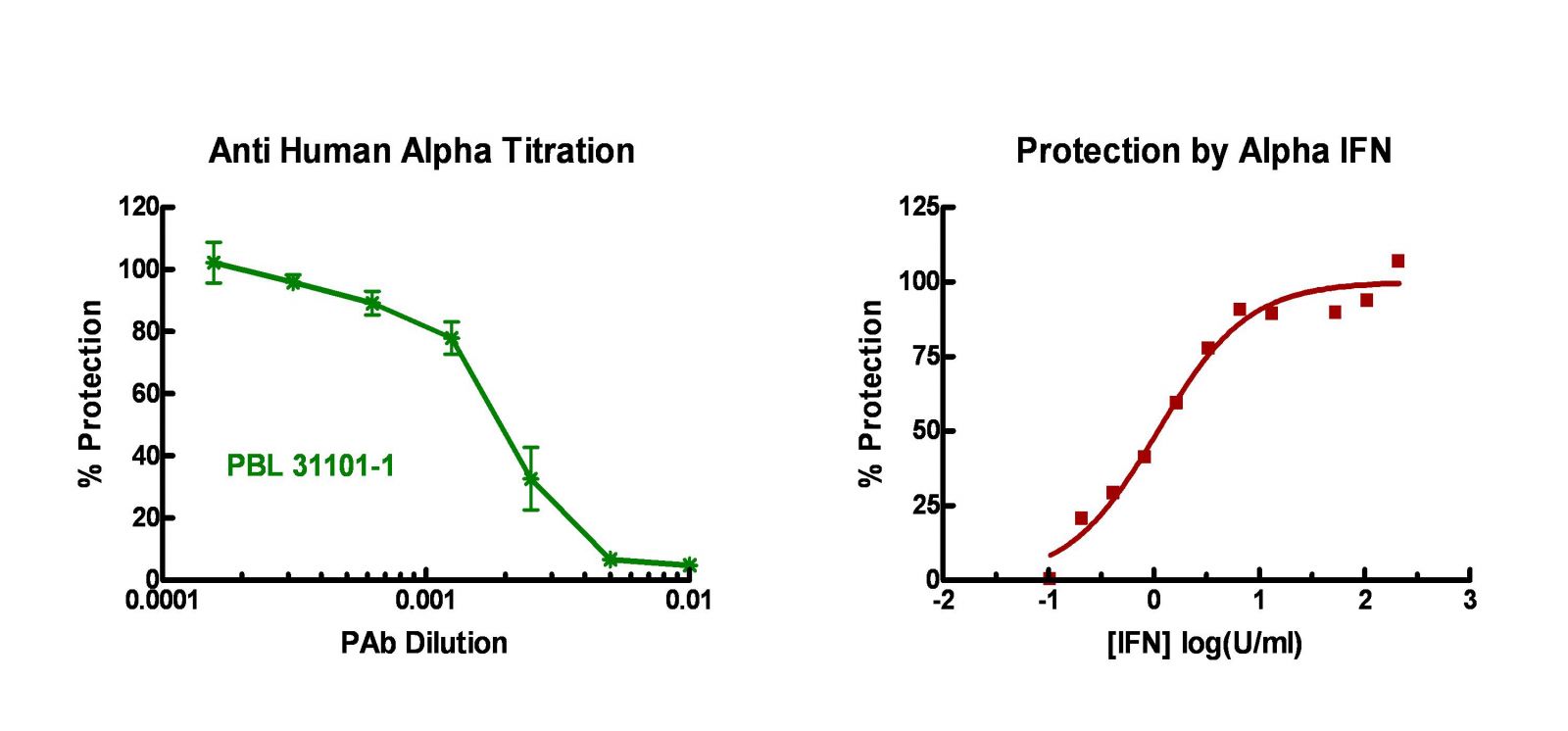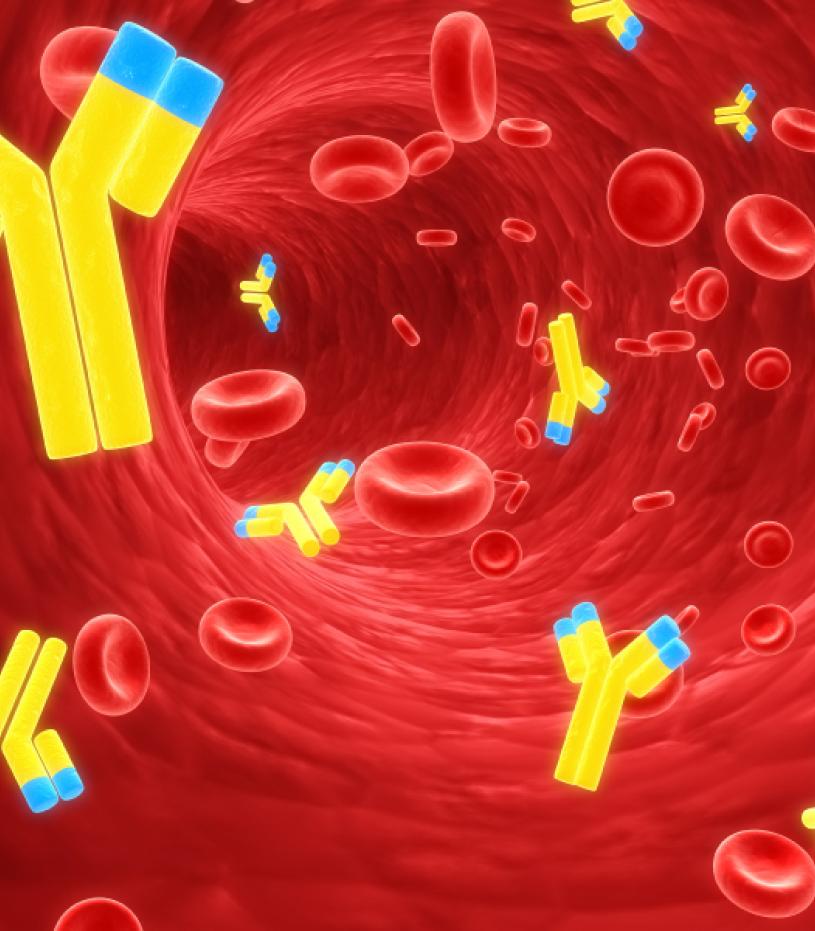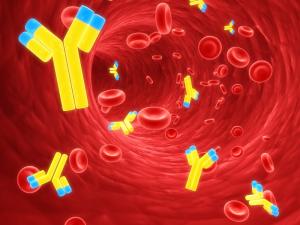Materials and Methods
Cell lines: Human A549 cells (human lung carcinoma) were maintained in F12 media supplemented with 10% FCS. LLC-MK2 (rhesus monkey kidney cells) were grown in MEM supplemented with 10% FCS as were the MDBK (bovine kidney cells). Cells were plated at subconfluent levels the day before neutralization experiments were initiated. Neutralization Assay: Human IFN-α2b at 50 U/ml (PBL catalog # 11105-1) was combined with dilutions of the neutralizing antibody rabbit anti-human IFN-α for 60 minutes then the IFN-α/PAb mixture was added to each respective cell line. The cells were subsequently returned to the incubator for 20 hrs. Each cell line was then subjected to viral challenge as follows: A549 cells were infected with a 1:10,000 dilution of encephalomyocarditis virus (EMCV) and MDBK cells were infected with a 1:100,000 dilution of vesicular stomatitis virus, while the LLC-MK2 cells were challenged with a 1:10,000 dilution. Plates were incubated for 24-36 hours following addition of virus cells were stained with crystal violet. The cell density was determined by OD450 measurement on a Molecular devices Vmax plate reader. Neutralization titers were determined by the following formula: Divide IFN-α units/well by serum dilution/well.
Results
The addition of IFN-α2 at 50U/ml resulted in complete protection of each cell line tested when challenged with the appropriate quantity of virus. In contrast, the cells which did not receive IFN-α2 displayed complete loss of monolayer. The addition of polyclonal antibody directed against human IFN-α2 displayed similar dose-dependent loss of antiviral activity regardless of cell type or virus.

Sample
A549 Neutralizing Titer
MDBK Neutralizing Titer
MK2 Neutralizing Titer
Rabbit anti-human IFN-α
3.1 x 105 U/mL
4.3 x 105 U/mL
1.3 x 105 U/mL
Discussion
Human IFN-α studies are primarily carried out on human cells. However, there are instances when other cell lines are utilized. MDBK cells have proven useful since they respond to human alpha interferons, but not to beta interferon. In contrast, non-human primate cells are often used as a prelude for more formal in vivo studies in monkeys. Neutralizing antibodies provide a useful tool to demonstrate that the effects are specifically due to interferon. However, it is not clear if the IFN-receptor interaction between each cell line tested could be inhibited by a polyclonal antibody. This study clearly indicated that the polyclonal antibody raised in rabbits against human IFN-α2 could indeed interact with the protein to sufficiently inhibit protein activity on all cell lines tested.
Materials and Methods
Cell lines: Human A549 cells (human lung carcinoma) were maintained in F12 media supplemented with 10% FCS. LLC-MK2 (rhesus monkey kidney cells) were grown in MEM supplemented with 10% FCS as were the MDBK (bovine kidney cells). Cells were plated at subconfluent levels the day before neutralization experiments were initiated. Neutralization Assay: Human IFN-α2b at 50 U/ml (PBL catalog # 11105-1) was combined with dilutions of the neutralizing antibody rabbit anti-human IFN-α for 60 minutes then the IFN-α/PAb mixture was added to each respective cell line. The cells were subsequently returned to the incubator for 20 hrs. Each cell line was then subjected to viral challenge as follows: A549 cells were infected with a 1:10,000 dilution of encephalomyocarditis virus (EMCV) and MDBK cells were infected with a 1:100,000 dilution of vesicular stomatitis virus, while the LLC-MK2 cells were challenged with a 1:10,000 dilution. Plates were incubated for 24-36 hours following addition of virus cells were stained with crystal violet. The cell density was determined by OD450 measurement on a Molecular devices Vmax plate reader. Neutralization titers were determined by the following formula: Divide IFN-α units/well by serum dilution/well.
Results
The addition of IFN-α2 at 50U/ml resulted in complete protection of each cell line tested when challenged with the appropriate quantity of virus. In contrast, the cells which did not receive IFN-α2 displayed complete loss of monolayer. The addition of polyclonal antibody directed against human IFN-α2 displayed similar dose-dependent loss of antiviral activity regardless of cell type or virus.

| Sample | A549 Neutralizing Titer | MDBK Neutralizing Titer | MK2 Neutralizing Titer |
| Rabbit anti-human IFN-α | 3.1 x 105 U/mL | 4.3 x 105 U/mL | 1.3 x 105 U/mL |
Discussion
Human IFN-α studies are primarily carried out on human cells. However, there are instances when other cell lines are utilized. MDBK cells have proven useful since they respond to human alpha interferons, but not to beta interferon. In contrast, non-human primate cells are often used as a prelude for more formal in vivo studies in monkeys. Neutralizing antibodies provide a useful tool to demonstrate that the effects are specifically due to interferon. However, it is not clear if the IFN-receptor interaction between each cell line tested could be inhibited by a polyclonal antibody. This study clearly indicated that the polyclonal antibody raised in rabbits against human IFN-α2 could indeed interact with the protein to sufficiently inhibit protein activity on all cell lines tested.


